- Home
- Kathy Reichs
Bare Bones Page 9
Bare Bones Read online
Page 9
I was opting for a bare-ass sprint when Ryan’s arm snaked around my waist. I looked down at him.
His eyes were fixed on my face. Amazing eyes. In the pale gray of dawn they looked almost cobalt.
“Ma’am?”
“Yes?” Tentative.
“I respect you with my whole heart and my whole soul, ma’am.” Somber as an evangelical preacher.
I drummed my fingers on his chest. “You’re not half bad yourself, cowboy.”
We shared a laugh.
Ryan tipped his head at the phone. “Sheriff rounding up a posse?”
I lowered my voice, CIA style. “If I told you that, I might have to kill you.”
Ryan nodded knowingly.
“Could you and the boys use an extra hand?”
“Seems we could. But they’ve only requested Boyd.”
He feigned disappointment. Then, “Could you put in a word, ma’am?”
I finger-drummed his chest again.
“Have you other talents, gunslinger?”
“This boy can shoot straight as a yard of pump water.”
Where did he get this stuff?
“But are you good at recovery?”
Ryan lifted the quilt.
I took a peek. Oh, yeah.
“I’ll see what I can do.”
“I’m beholden, ma’am. In the meantime, how about I hep you out in the shower?”
“One condition.”
“Anything you say, ma’am.”
“Loose the Chester bit.”
We both sprinted naked to the bathroom.
* * *
Two hours later I was heading toward the Cowans Ford bridge. Ryan was beside me. Boyd was doing his bird dog routine in back. My car’s AC was whirring at “max.” I hoped I would recognize the turnoff.
Noting the high ceiling and clear sky, I pictured Harvey Pearce and wondered why the man had augered into a visible rock face on a sunny Sunday afternoon.
I pictured the macabre black residue coating Pearce and his passenger, and wondered again what that substance could be.
I also wondered about the passenger’s parentage. And about his odd nasal lesion.
“What are you thinking?” Ryan pushed Boyd’s snout from his ear.
Boyd shot to the window behind me.
“I thought men hated to be asked that question.”
“I’m not like other guys.”
“Really.” I cocked an eyebrow.
“I know the names of at least eight colors.”
“And?”
“I don’t kill my own meat.”
“Hmm.”
“Thinking about last night?” Ryan flashed his eyebrows. I think he was picking the schtick up from Boyd.
“Something happen last night?” I asked.
“Or tonight?” Ryan gave me the have-I-ever-got-something-in-mind-for-you look.
Yes! I thought.
“I was thinking about the Cessna crash,” I said.
“What troubles you, buttercup?”
“The passenger was in back.”
“Why was that? No upgrades?”
“There was no right front seat. He flew forward on impact. Why wasn’t he buckled in?”
“Didn’t want to wrinkle his leisure suit?”
I ignored that.
“And where was the right front seat?”
“Blasted out on impact?”
“I didn’t see it among the wreckage.” I spotted the turnoff and made a left. “Neither Jansen nor Gullet mentioned one.”
“Gullet?”
“Davidson PD. The local cop on the scene.”
“Could the seat have been removed for repairs?”
“I suppose that’s a possibility. The plane wasn’t new.”
I described the black gunk. Ryan thought a moment.
“Don’t you people call yourselves tarheels?”
For the rest of the trip I listened only to Public Radio.
* * *
When I pulled up at the farm adjoining McCranies’, vehicles clogged one side of the road. This time the assemblage included Tim Larabee’s Land Rover, a police cruiser, the CMPD crime scene truck, and the MCME transport van.
Two kids watched from the opposite shoulder, spindly legs hanging from cutoff jeans, fishing gear strapped to their bikes. Not bad as far as gawkers go. But it was still early, just past eight. Others would arrive once our little army was spotted. Passersby, the neighbors, perhaps the media, all salivating for a glimpse of the misfortune of others.
Larabee was standing on the lawn with Joe Hawkins, two CMPD uniforms, one black, one white, and the pair of crime scene unit techs who’d helped recover the bear bones.
Someone had made a Krispy Kreme run. Everyone but the black cop held a Styrofoam cup and a doughnut.
Boyd leaped up, nearly knocking himself unconscious against the roof when Ryan and I left him in the backseat. Righting himself, he stuck his snout through the six inches of open window and began licking the exterior glass in a circular pattern. His yips followed us to the little circle beside the blacktop.
After introductions, during which I simply identified Ryan as a visiting police colleague from Montreal, Larabee laid out the plan. Officers Salt and Pepper looked hot and bored, seeming curious only about Ryan.
“This property is supposed to be abandoned, but the officers are going to look around to see if they can interest anyone in their warrant.”
Officer Salt shifted his feet, finished the last of his chocolate with sprinkles. Officer Pepper folded his arms across his chest. The muscles looked the size and strength of banyan roots.
“Once the officers give the go-ahead, we’ll cruise the dog around, get his thoughts on the place.”
“His name is Boyd,” I said.
“Boyd sociable?” asked the CSU tech with the granny specs.
“Offer him a doughnut, you’ve got a buddy for life.”
Red sun flashed off a lens as she turned to look at the chow.
“Boyd hits, we dig,” Larabee went on. “We find any human remains our anthropologist here determines to be suspicious, the warrant says we can toss the place. Everyone OK with that?”
Nods all around.
Ten minutes later the cops were back.
“No signs of life in the house. Outbuildings are empty,” said Officer Salt.
“Place has the charm of a hazardous waste dump,” said Officer Pepper. “Watch yourselves.”
“OK,” Larabee said to me. “You three take the western half.” He raised his chin at Hawkins. “We’ll take the east.”
“And we’ll be in Scotland afore ye,” sang Ryan.
Larabee and Hawkins looked at him.
“He’s Canadian,” I said.
“Boyd hits, give a holler,” said Larabee, handing me a radio.
I nodded and went to leash the chow, who was bursting with eagerness to serve.
* * *
The farm wasn’t really a farm. My herb garden produces a higher yield of edibles.
The crop here was kudzu.
North Carolina. We’re mountains. We’re beaches. We’re dogwoods, azaleas, and rhododendron.
And we’re up to our asses in kudzu.
Pueraria lobata is native to China and Japan, where it’s used as a source of hay and forage, and for control of soil erosion. In 1876 some horticultural genius decided to bring kudzu to the United States, thinking the vine would make a great ornamental.
The legume took one look at the Southern states and said, “Hot diggity!”
In Charlotte, you can sit on your porch on summer nights and hear the kudzu edge forward. My friend Anne claims she once set out a marker. In twenty-four hours the runners on her banister had advanced two inches.
Kudzu covered the rusted chain-link fence at the back of the property. It slithered along power lines, swallowed trees and bushes, and blanketed the house and its outbuildings.
Boyd didn’t care. He dragged me from vine-draped oak to magnolia to
pump house to well, sniffing and wagging as he had at the annex.
Other than the depression left behind by the bear bones, nothing got a rise but the chipmunks and squirrels.
Boyd of the Baskervilles.
By eleven the mosquitoes had drained so much blood I was starting to think “transfusion.” Boyd’s tongue was barely clearing the ground, and Ryan and I had said “fuck” a thousand times each.
Fat, leaden clouds were drifting in overhead and the day was turning dark and sluggish. An anemic little breeze carried the threat of rain.
“This is pointless,” I said, wiping the side of my face on the shoulder of my T-shirt.
Ryan didn’t disagree.
“Except where we went digging for bear by the McCranie hedge, dogbreath hasn’t so much as stiffened a whisker.”
“He liked that sneak swoop-and-sniff of your tush.” Ryan addressed Boyd. “Didn’t think I was watching, did you, Hooch?”
Boyd looked at Ryan, went back to licking a rock.
“Ryan, we need to do something.”
“We are doing something.”
I cocked an eyebrow.
“We’re sweating.”
Katy would have been proud of the eye roll.
“And doing a damn fine job of it, considering this heat.”
“Let’s stroll Boyd past the hedge one more time, remind him what we’re looking for, then make a final sweep and call it a day.”
I put my hand down and Boyd licked it.
“Sounds like a plan,” said Ryan.
I wrapped the leash around my palm and yanked. Boyd looked up and twirled the eyebrow hairs, as though questioning the sanity of another sortie.
“I think he’s getting bored,” Ryan said.
“We’ll find him a squirrel.”
When Ryan and I set off, Boyd fell into step. We were weaving through the outbuildings at the back of the house, when the chow went into his “sniff-squirt-and-cover” routine.
Moseying up to a kudzu-shrouded shack, Boyd snuffled the earth, lifted a leg, took two forward steps, then kicked out with both back feet. Tail wagging, he repeated the maneuver, working his way along the foundation.
Sniff. Lift. Squirt. Step, step. Kick, kick.
Sniff. Lift. Squirt. Step, step. Kick, kick.
“Good rhythm,” said Ryan.
“Pure ballet.”
I was about to tug Boyd from the shed when his muscle tonus changed. His head and ears shot forward and his belly sucked up.
One beat.
Snout to the ground.
Another beat.
Muscles rigid, Boyd inhaled then exhaled through his nostrils, sending dead vegetation spiraling outward.
Then the dog went absolutely, utterly still.
A heartbeat. A lifetime.
Boyd’s ears flattened, his hackles rose, and an eerie sound crawled from his throat, more keening than growl.
The hairs on my neck went vertical. I’d heard it before.
Before I could speak, Boyd exploded. Lips curled, teeth gleaming, the keening gave way to frenzied barking.
“Easy, Boyd!”
The chow lunged forward and backward, delivering his threat from every angle.
I tightened my grip and braced both feet.
“Can you hold him?” I asked.
Without a word, Ryan took the leash.
Heart pounding, I circled the shed, searching for a door.
The radio crackled. Larabee said something.
I found the entrance on the south side, away from the house. Gingerly brushing back spiderwebs, I pulled on the handle.
The door wouldn’t budge.
I looked up and down along the frame. Two nails held the door in place. They looked new compared with the dry, flaky wood around them.
Boyd’s frenzy continued. Ryan held tight to the leash, calling “Hooch,” then “Boyd” to calm him.
Unfolding my Swiss army knife, I gouged out one nail, then the other.
Larabee’s voice sounded small and tinny on the radio, as though emanating from some alien star system.
I depressed the button and reported my position.
When I tried again, the door creaked open, and a fetid, earthy smell drifted out, like dead plants and garbage left too long in the sun. Flies buzzed in agitation.
Cupping a hand across my mouth and nose, I peered in.
Flies danced in threads of light slicing in through gaps in the boards. Slowly, my eyes adjusted to the dim interior.
“Perfect,” I said. “Picture fucking perfect.”
I WAS STARING INTO A PRIVY.
At one time chez toilette offered state-of-the-art comfort in human waste disposal technology: insect control, toilet paper, a spiffy oneseater with a flip-top lid.
All that was gone now. What remained were dried and shriveled pest strips, a rusted flyswatter, two nails driven into a board at sitting height, a pile of splintered wood, and a chipped and flaking wooden pink oval.
A pit approximately two feet square yawned through an opening in the floorboards at the far end of the shack.
The stench was familiar, bringing to mind privies in summer camps, national parks, and Third World villages. This one smelled sweeter, softer, somehow.
My mind added a string of expletives to those Ryan and I had floated during our walkabout with Boyd.
“Crap!” I said aloud for emphasis.
Not three months earlier I’d been up to my elbows investigating debris in a septic tank. I’d vowed never to slog through feces again.
Now this.
“Crap! Crap! Crap!”
“Not very ladylike.”
Larabee craned over my shoulder. I stepped aside. Behind us Boyd continued his frenzy and Ryan continued his attempts to calm him.
“But entirely apropos.” I slapped a mosquito that was lunching on my arm.
Larabee stuck his head into the privy, pulled it back quickly.
“Could be Boyd was just rocked by the smell.”
I scowled at Larabee’s back.
“Could be. But you’re going to want to check it out,” I said. “Make sure no one’s been pissing on Jimmy Hoffa.”
“No one’s been pissing on anyone in here for some time.” Larabee let the door bang shut. “The grand-finale whiz probably took place during the Eisenhower years.”
“Something’s going bad in that pit.”
“Yep.”
“Suggestions?” I backhanded gnats from my face.
“Backhoe,” he said.
“Can we take a look in the house first, try to estimate when Farmer John splurged for the indoor pipes?”
“Find me one human bone, I’ll have CSU shooting close-ups under the sink.”
* * *
A metacarpal came up with the seventh scoop.
Joe Hawkins, Ryan, and I had been working the privy for three hours. Bucketful by bucketful, the pit was giving up its treasure.
That treasure consisted of shards of broken glass and china, scraps of paper, chunks of plastic, rusted utensils, animal bones, and gallons of deep, black organic matrix.
The backhoe operator would scoop, deposit, and wait. Hawkins would triage bones to one pile, household debris to another. Ryan would transport buckets of compost to my screen. I’d sieve and rummage.
We were growing optimistic. The skeletal part of the treasure looked strictly nonhuman and purely culinary. And, unlike Boyd’s discovery at the McCranie hedge, the privy bones were devoid of tissue.
These animals had been dead a long time.
The metacarpal turned up at 3:07 P.M.
I stared at it, searching for something to allow me doubt.
There was no doubt. The bone had been part of a thumb. A thumb that could hitchhike, twirl spaghetti, play trumpet, write a sonnet.
I gave in and closed my eyes.
Hearing footsteps, I opened them. Larabee was circling the pile of wreckage that until hours earlier had been the outhouse.
“How’s Boyd
doing?” I asked.
“Enjoying a cool one on the front lawn. The chow’s not bad company.”
Seeing my face his smile evaporated.
“Find something?”
I brought my hand up and positioned the metacarpal next to the base of my thumb.
“Damn.”
Ryan and Hawkins joined us at the screen.
“Damn.” Ryan echoed Larabee.
Hawkins said nothing.
The backhoe operator put a boot heel on the control panel, leaned back, and gulped bottled water.
“Now what?” Larabee asked.
“The digger’s got a delicate touch,” I said. “And the pit conforms pretty well to the shape of the shovel. I think we can keep going like this. Whatever’s in there isn’t likely to be damaged.”
“I thought you hated backhoes?”
“This guy’s good.”
We all glanced at the operator. He looked like he could possibly be less interested. But only with the aid of serious pharmaceuticals.
Thunder rumbled in the distance. The sky was now dark and menacing.
“How much longer?” Larabee asked.
“I’ve started seeing sterile subsoil in the last few scoops. We’re close to the bottom.”
“OK,” Larabee said. “I’ll turn CSU loose on the house.”
He straightened.
“And Tim?” I said.
“Yeah?”
“This may be a good time to get homicide on board.”
* * *
We finished as drops began sputtering from the sky.
I raised my chin, thankful for the cool wetness on my face.
I was exhausted and incredulous. So much work, and just when I most wanted to be free.
Gran would have been unsympathetic. Born on the auld sod and educated by nuns, the old lady had a unique perspective on sex, particularly sex not sanctioned by the parish priest.
No marriage, no whoopie. In her eighty-nine years on earth, she’d never budged from that position, and to my knowledge, had never condoned exceptions.
Wrapping my arms around my waist, I watched Ryan bundle the animal bones into a Hefty bag.
I watched Hawkins seal the human remains in a plastic tub, pull a body tracking form from a zip valise, and start filling in data.
Address where decedent was picked up.
OK. We had that.
Decedent’s name. Age. Race. Sex. Date of death.
All those lines remained blank.
Body condition.

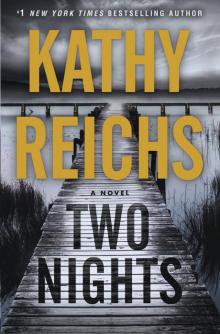 Two Nights
Two Nights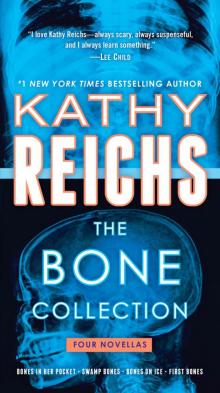 The Bone Collection: Four Novellas
The Bone Collection: Four Novellas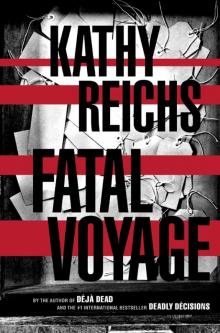 Fatal Voyage
Fatal Voyage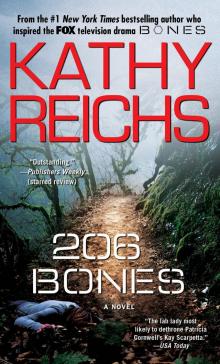 206 Bones
206 Bones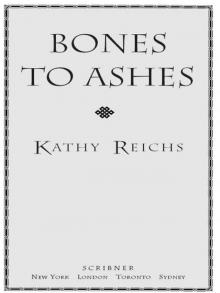 Bones to Ashes
Bones to Ashes Terminal
Terminal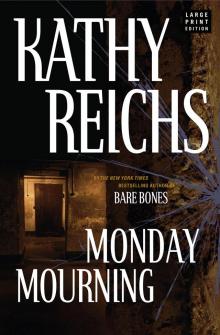 Monday Mourning
Monday Mourning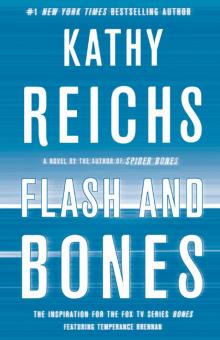 Flash and Bones
Flash and Bones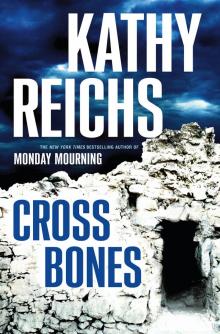 Cross Bones
Cross Bones Devil Bones
Devil Bones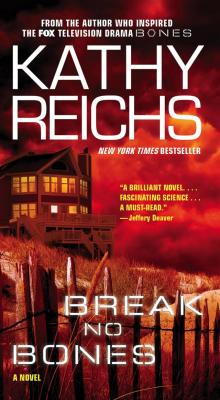 Break No Bones
Break No Bones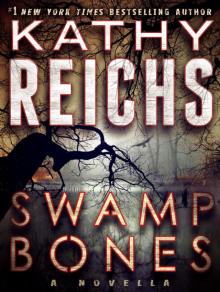 Swamp Bones
Swamp Bones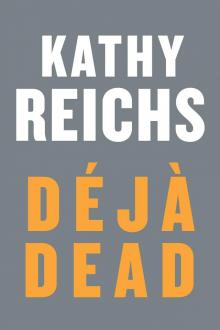 Déjà Dead
Déjà Dead Shock
Shock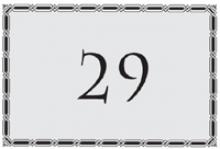 Spider Bones
Spider Bones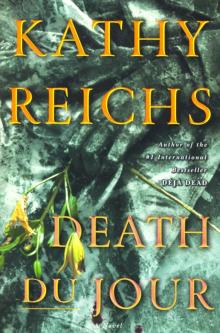 Death Du Jour
Death Du Jour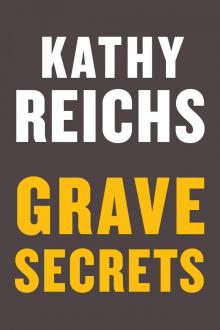 Grave Secrets
Grave Secrets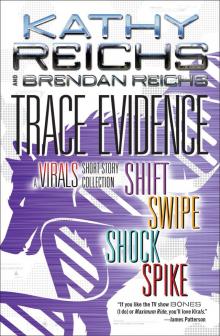 Trace Evidence: A Virals Short Story Collection
Trace Evidence: A Virals Short Story Collection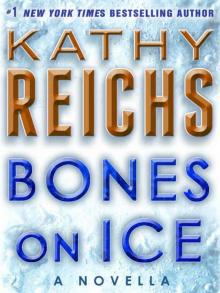 Bones on Ice
Bones on Ice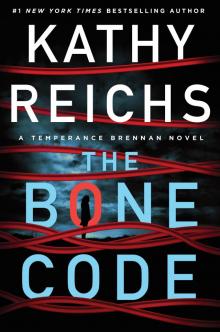 The Bone Code
The Bone Code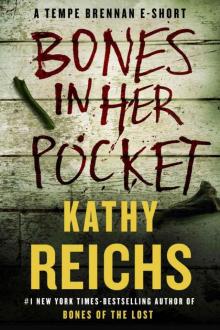 Bones in Her Pocket
Bones in Her Pocket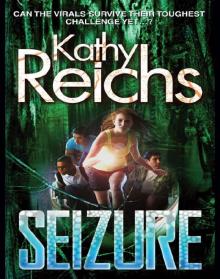 Seizure:
Seizure: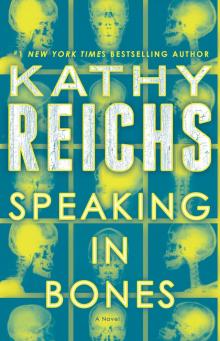 Speaking in Bones
Speaking in Bones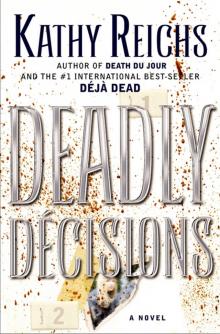 Deadly Decisions
Deadly Decisions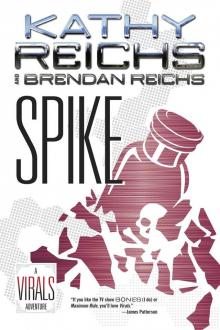 Spike
Spike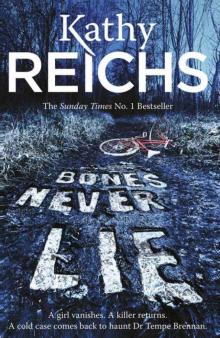 Bones Never Lie
Bones Never Lie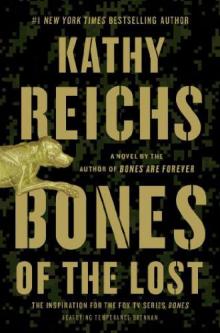 Bones of the Lost
Bones of the Lost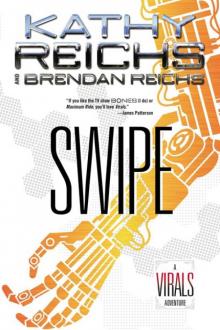 Virals 03.5 - Swipe
Virals 03.5 - Swipe Exposure
Exposure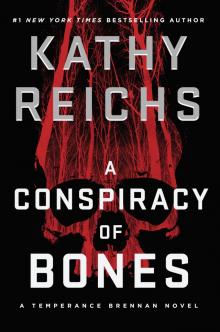 A Conspiracy of Bones
A Conspiracy of Bones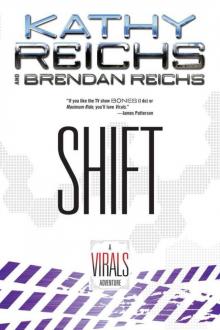 Shift (tory brennan)
Shift (tory brennan)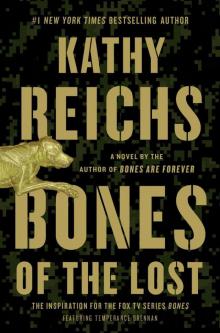 Bones of the Lost: A Temperance Brennan Novel tb-16
Bones of the Lost: A Temperance Brennan Novel tb-16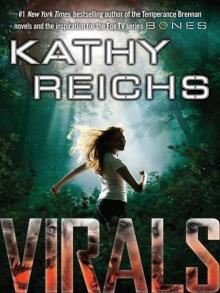 Virals tb-1
Virals tb-1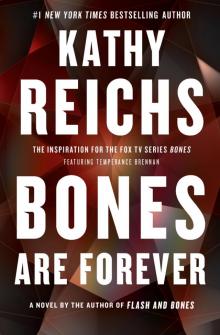 Bones Are Forever tb-15
Bones Are Forever tb-15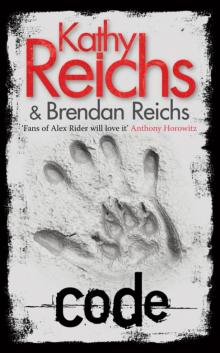 Code tb-3
Code tb-3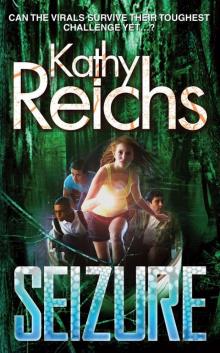 Seizure tb-2
Seizure tb-2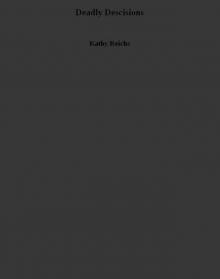 Deadly Descisions
Deadly Descisions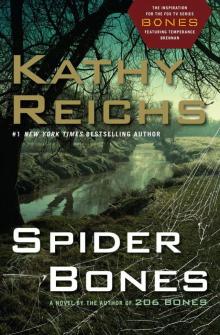 Spider Bones: A Novel
Spider Bones: A Novel